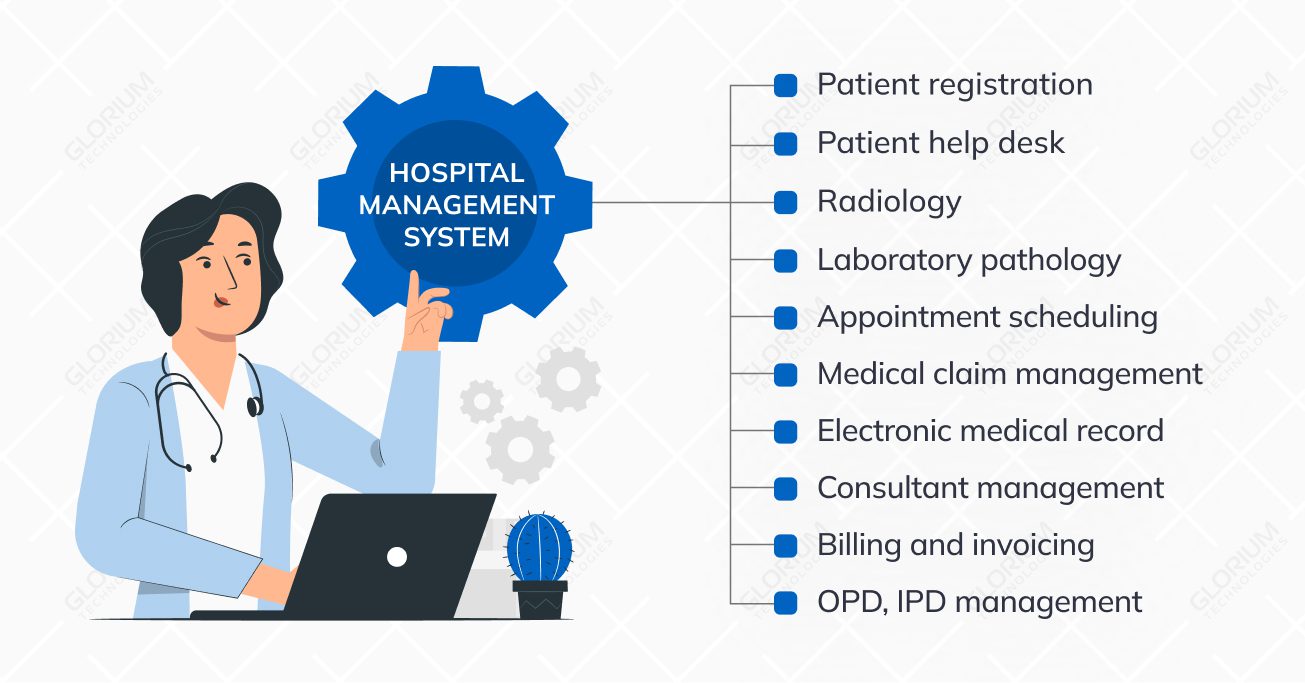Best Hospital Management Software System

In the evolving landscape of healthcare, technological innovations are redefining how medical institutions operate and deliver patient care. At the forefront of this revolution is the Best Hospital Management Software (HMS) software – a sophisticated and comprehensive solution designed to streamline the complex web of administrative, operational and clinical processes within healthcare facilities.
As healthcare professionals navigate the challenges of an increasingly complex environment, the need for efficiency, accuracy and seamless coordination becomes paramount. HMS software has emerged as a beacon of transformative change, promising to reshape traditional practices and usher in a new era of healthcare management.
This introduction aims to unveil the essence of HMS software, discuss in detail its key features, benefits and its profound impact on healthcare organisations. From patient information management to financial optimization, the HMS software journey describes improved patient outcomes, improved resource utilization and a coherent approach to healthcare administration. Join us in this exploration of how HMS software is not just a tool but a catalyst for positive change in the healthcare industry, driving organisations toward a future characterized by efficiency, innovation and superior patient care.
Key Features and Benefits

Patient Information Management:Hospital Management System software centralises patient records, enabling healthcare providers to access comprehensive patient information instantly. This leads to improved decision-making, personalised care, and a more efficient patient experience.
Appointment Scheduling and Management:With advanced scheduling modules, HMS software empowers healthcare facilities to optimise appointment bookings, reduce waiting times, and enhance the overall patient journey. Real-time scheduling updates ensure seamless coordination between staff, patients, and resources.
Billing and Financial Management:Automating billing processes and financial management, HMS software minimizes errors, ensures accurate invoicing, and facilitates quicker reimbursement cycles. This leads to improved financial transparency, reduced administrative burdens, and increased revenue streams.
Inventory and Resource Management:Efficient resource utilization is critical in healthcare. HMS software tracks and manages inventory levels, medical equipment, and other resources, preventing shortages or overstocking. This results in cost savings and ensures that essential supplies are always available.
Electronic Health Records (EHR) Integration

Integrating seamlessly with EHR systems, HMS software promotes interoperability and a unified approach to patient care. This facilitates real-time data exchange, reduces redundancies, and enhances collaboration among healthcare professionals.
Electronic Health Records (EHR) integration refers to the seamless incorporation of Electronic Health Records systems into other healthcare software or systems, such as Hospital Management System (HMS) software. EHRs are digital versions of patients’ paper charts, containing comprehensive information about their medical history, diagnoses, medications, treatment plans, immunisation dates, allergies, radiology images, and laboratory test results.
Reporting and Analytics:Robust reporting and analytics tools within HMS software enable healthcare administrators to gain valuable insights into operational performance, patient outcomes, and resource utilisation. Informed decision-making is crucial for optimising processes and improving overall efficiency.
Security and Compliance:Protecting sensitive patient information is a top priority in healthcare. HMS software adheres to stringent security measures and compliance standards, ensuring data confidentiality, integrity, and availability. This instills trust among patients and regulatory bodies.
Conclusion:
Hospital Management System (HMS) software stands as a transformative solution in the healthcare sector, revolutionizing the way institutions manage their operations. From patient information to financial processes, HMS software offers a comprehensive approach, improving efficiency, streamlining workflows, and enhancing patient care. Key features include appointment scheduling, billing, inventory management, and integration with Electronic Health Records (EHR). The software’s commitment to security and compliance ensures the protection of sensitive data. By embracing HMS software, healthcare institutions position themselves at the forefront of innovation, fostering a future marked by optimized resource utilization, informed decision-making, and superior patient experiences.
FAQ sfor Hospital Management System (HMS) software
Q1: What is Hospital Management System (HMS) software? A1: Hospital Management System (HMS) software is a comprehensive solution designed to streamline and automate various administrative and operational processes within healthcare institutions. It encompasses features such as patient information management, appointment scheduling, billing, inventory management, and more.
Q2: How does HMS software benefit healthcare institutions? A2: HMS software benefits healthcare institutions by improving efficiency, enhancing patient care, optimizing resource utilization, and ensuring better management of administrative tasks. It centralises data, automates processes, and provides valuable insights for informed decision-making.
Q3: What key features does HMS software typically include? A3: HMS software typically includes features such as patient information management, appointment scheduling, billing and financial management, inventory and resource management, electronic health records (EHR) integration, reporting and analytics, and security measures to protect patient data.
